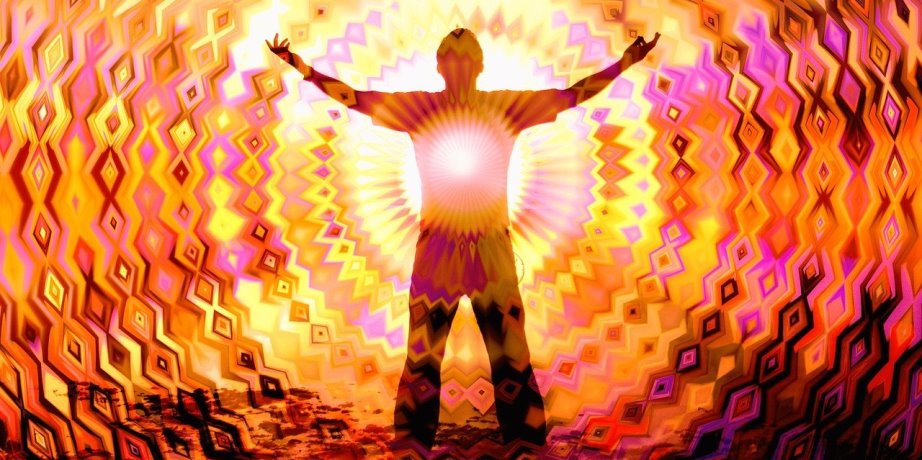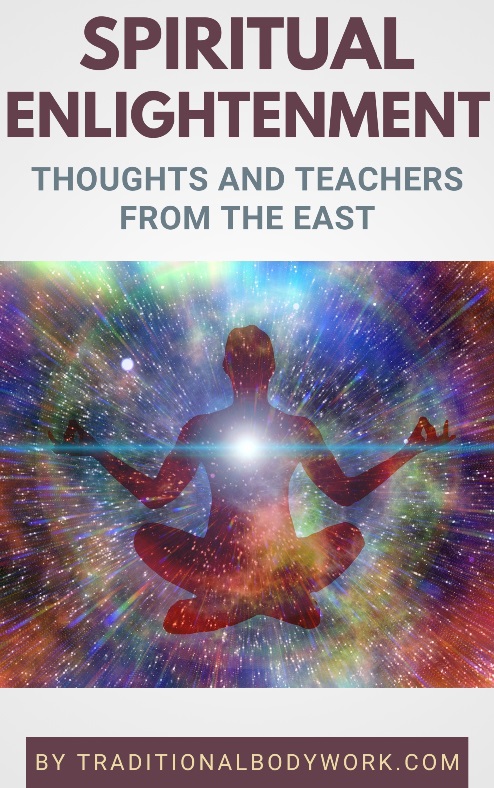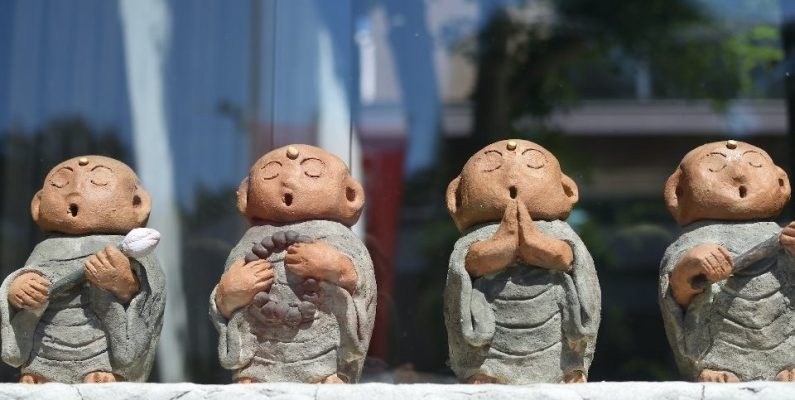
From On The Transmission of Mind.
— Huang Po
To understand what Spiritual Enlightenment is we first need to know why we would want it. And after answering that question, it will perhaps be easier to tell what-it-is.
Now, it seems to me that we want Spiritual Enlightenment — or Spiritual Awakening — because we assume or hope it will bring us the end of our suffering, clear insight in the mechanisms of life and our Self, and by all that, everlasting, radiating happiness, and maybe even — immortality.

One of the mainstream ideas is that Spiritual Enlightenment is some kind of natural, necessary, and logical next step evolutionary development of the human race; something like gradually progressing through various stages of transformation departing from “the material plane” and then — by following a certain set of intermediate steps— finally reaching “the spiritual plane.”
Spiritual Enlightenment is often regarded as something we can get, achieve, or reach. It’s some sort of becoming. Becoming something else, that is, “something better” than we are now. It’s supposed to be an improvement of ourselves.
However, contrasting this camp are those who claim we cannot get or reach Spiritual Enlightenment or anything like it, because Spiritual Enlightenment totally “transcends the idea of becoming.”
Others say it takes a long and extremely difficult road, with lots of preparation, but then some claim there’s most certainly no “road” at all, rather a kind of sudden jump invoked by illuminating Insight or Understanding. But then, often also … what exactly that Insight or Understanding is, or how it comes about, is heavily disputed.
We have those who say we should do specific things, like for instance: meditation, prayer, diets, ethical conduct, and even rebirths if you are into that, and again others who say we should certainly not do, that one cannot do, and does not need to do anything at all because that would obstruct the whole enterprise.
Others believe that “getting or not getting enlightened” is shaped by our Karma, but then again some claim it’s the destiny of the soul, or even the opposite — a matter of coincidence.
There are who maintain that we are in fact already “enlightened beings,” but that we just don’t know we are i.e. we only need to recognize it. And then there are those who claim that yes, we are, but we can never ever know or experience it i.e. there’s no point in wanting or doing anything, and so on.
We have developed Yoga, religions, selfless work, devotion and prayer, Zen Buddhism, Taoism and Daoism, Hare Krishnas, Advaita Vedanta and many other systems, methods, and techniques to achieve Spiritual Enlightenment, and it seems we’ll invent many, many more in years to come.
We also have the Anti-Enlightenists who say it’s all hocus-pocus and a big bunch of rubbish, but again others who try desperately to reform the whole idea giving it a more rational stance and now call it Personal Development or Inner Work.
Sometimes, it’s said one can only attain Spiritual Enlightenment with the help of a Guru or Master, but others claim you do not necessarily need one or even emphasize to stay far away from them, and there are who declare that everything in life is our Guru.
But whatever may be, if we would accept (for the moment anyway), that there is really a thing called Spiritual Enlightenment, we would of course want to know how to get it and maybe even more — we’d want to know how to recognize or identify it when we’ve finally got it.
The “recognize it” part is surely as much as interesting as the “how to get it” part. Here also, we will come to see that just as becoming enlightened, it is not very clear how to identify “being enlightened.”

The claimants (those who state they are spiritually enlightened) say you can’t know, see, or recognize if someone is enlightened because Spiritual Enlightenment surpasses the intellectual and phenomenal sphere and is by its essence a vast and unbounded modality. Well, and because of this, as Spiritual Enlightenment has no limits, it expresses itself in an infinite number of ways, characteristics, and personalities.
But to know if we ourselves are enlightened, that’s another issue. I think in this case we should again consider our reasons for wanting Spiritual Enlightenment, because when we come to feel or experience the end of our suffering, absolute insight in the workings of life, true knowledge about our Self, and radiating happiness, well, then we have probably reached it. Haven’t we?
However, the problem is that we don’t know (and in fact cannot know) if this “enlightened state” will be permanent. Will we have doubts again? Will we maybe suffer again one day? And also — are we not fooling ourselves about our “Insights in the workings of Life?” Are our findings really true?
So, naturally, the new question that arises is how to be sure that we are enlightened? As said, the answer to that is: we can’t! We can’t, for we can’t know if there will be a regression. In contrast, when a regression manifests, we’ll surely know that we weren’t enlightened at all. That we fooled ourselves. That seems perhaps the only real certainty we can get.
With regard to this, many theories have developed of which most look for physical signs or marks. Some say our cell-structures change, others that we get blue-encircled eyes or a little aureole above our heads, or become very calm and peaceful.
We look for hot and cold, awakened Chakras, colors, auras, magnetic fields and psychic powers and — we’ve developed all sorts of high-tech equipment to measure and catch these phenomena. But then again, opinions vary significantly on what are exactly the “genuine signs” of “being enlightened,” not to speak about the validity of the equipment we use.
In our days, Spiritual Enlightenment, New Age, New Meaning, Personal Development, and spirituality in general, have become big, big business. It’s a grown-up, multi-billion dollar industry. We already had plenty spiritual and religious books, Holy Scriptures and philosophical works, but I think we’ve effortlessly doubled or tripled the amount of material available in only the last thirty years.
And it’s not only about books. There are many who have made themselves a versatile job out of this. There are professional Gurus, teachers, speakers and Messiahs, all dressed up with their own unique way of “bringing the message.” Some have worldwide organizations and agendas, shops, websites and blogs, (on-line) meetings, retreats and ashrams and they sell state-of-the-art how-to-guides, DVDs, CDs, live-chats, webinars, and streaming video.
Now, of course, I don’t know if they are or were genuine, authentic, or truthful, but we cannot always avoid the suspicion that at least some of them either did or do it for-the-money or just didn’t or don’t know what they were or are talking about.
But that’s not really what this post is about, so I’ll skip the money-thing and the credentials. And besides that, I don’t have a clue of what exactly Spiritual Enlightenment is, that is, I’m not qualified, so when it comes to that — how can I judge anyway?

But let’s go back now to our initial question: “What is Spiritual Enlightenment?”
Today, after more than thirty-five years of research, reading, searching, visiting Gurus and the like, I must admit I have failed to definitely answer the question positively and satisfactorily. Nevertheless, I did find some interesting pointers.
First of all, there are many Spiritual Enlightenment systems and methods. That’s a fact. And most of those simply contradict each other. That’s also a fact. And … there seems to be no way of knowing which approach is good, true, or best, because secondly, we have no objective means of proving our own or others’ state of “enduring Spiritual Enlightenment.”
Hence, it looks like this: we don’t know what Spiritual Enlightenment is, we don’t know how to attain it, and we don’t know how to recognize that we’ve really got it. Moreover, this last fact will always obstructs us getting anywhere with the two initial ones.
Yet, what is very certain is that Spiritual Enlightenment is a wish for an enduring state of happiness, the end of our suffering, and truthful, persistent insight in the workings of Life and our Self. Spiritual Enlightenment is thereby foremost — wishful thinking.
But in the end it seems to me, and I tend to follow the philosopher Ludwig Wittgenstein on this one, that “Whereof we cannot speak, thereof one must be silent.”















